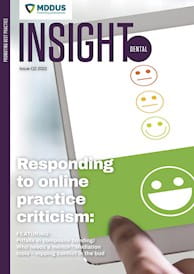
PATIENT complaints come in many forms. They can be made verbally or in writing, and range from a simple expression of concern regarding a single issue to complex matters involving a series of events and multiple organisations. How practices go about resolving a complaint will understandably vary depending on the circumstances.
MDDUS has seen an increase in requests for advice on challenging encounters with patients and complaints. One often overlooked aspect of complaints handling is how to document such matters and subsequent procedures.
NHS complaints procedures state that relevant correspondence should not be held within the patient’s clinical records. This may seem counterintuitive, as clinical records should accurately reflect events that have led up to a complaint. Wouldn't keeping such information in the records allow for ease of access and also ensure the information remains secure and confidential?
Separately and securely
There are three main reasons why complaints records should be stored separately and securely from clinical records in either paper or electronic format.
- Only individuals involved in the investigation process should have access to these records, as patients have a right for their complaint to be handled confidentially.
- Separating the complaint from the medical record also acts to ensure that a complaint will not impact the way a patient may be treated in the future. General Medical Council Standard 5.1.7 states: “You should keep a written record of all complaints together with your responses. This record should be separate from your patient records so that patients are not discouraged from making a complaint. You should use your record of complaints to monitor your performance in handling complaints and identify any areas that need to be improved.” Dealing with complaints as a separate issue from the treatment a patient receives will ensure this guidance is adhered to.
- Compliance with data protection arrangements. NHS complaints procedures for each of the UK nations detail how long complaints correspondence should be retained. Since clinical records must be retained for a patient that continues to attend a dental practice and for a time period after they leave, it would be challenging to proactively identify complaints correspondence within patient records in order to remove them after the retention period.
Unacceptable patient behaviour
There are times when patient dissatisfaction is expressed in an unacceptable manner, involving verbal or physical aggression. In such circumstances it may be acceptable and necessary to record this within a patient’s clinical records.
Creating a short entry in the clinical records accurately describing the behaviour or incident (or adding an alert) can be helpful to warn colleagues of the risk of such behaviour being repeated. A warning letter will often be issued in such cases with a copy retained within the clinical records.
Practices should be clear on how to document such matters. A blanket policy should not be applied, and instead consideration should be given to each incident separately to decide whether making an entry in the patient’s clinical records is appropriate.
Should you feel this is warranted but are unsure what level of detail or how to document this appropriately, seek advice from a senior colleague, manager or MDDUS.
Police should be involved as soon as possible with patients who act violently towards staff or other patients.
Ending a professional relationship
In some cases you may decide that an irreparable breach of trust has occurred, leaving little choice but to end the professional relationship with a patient. The GDC offers guidance on this at Standard 1.7.8.
"In rare circumstances, the trust between you and a patient may break down, and you may find it necessary to end the professional relationship. You should not stop providing a service to a patient solely because of a complaint the patient has made about you or your team. Before you end a professional relationship with a patient, you must be satisfied that your decision is fair and you must be able to justify your decision. You should write to the patient to tell them your decision and your reasons for it. You should take steps to ensure that arrangements are made promptly for the continuing care of the patient.”
Should you decide there is no other choice but to end the professional relationship it is essential to alert the patient of that decision. There may be reason to justify recording this in the clinical record, depending on the circumstances leading to that decision.
Always seek advice if you are unsure.
A recent MDDUS article, which explores this aspect in greater detail, can be found here.
ACTIONS
- Ensure there is clarity around how to record patient complaints and store related correspondence.
- Be clear on how/when to document unacceptable behaviour from a patient.
- Seek advice from a senior colleague/manager or MDDUS if you are unsure of organisational policy or any aspect of complaints handling/recording.
Kay Louise Grant is a risk adviser at MDDUS
This page was correct at the time of publication. Any guidance is intended as general guidance for members only. If you are a member and need specific advice relating to your own circumstances, please contact one of our advisers.
Read more from this issue of Insight Dental

Save this article
Save this article to a list of favourite articles which members can access in their account.
Save to library